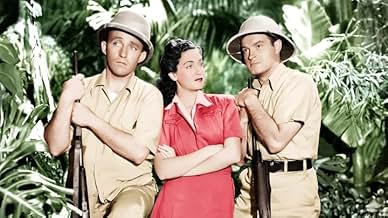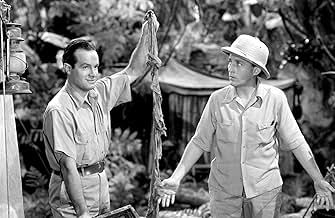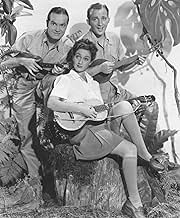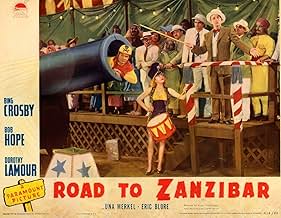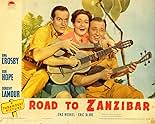CALIFICACIÓN DE IMDb
6.7/10
3.5 k
TU CALIFICACIÓN
Agrega una trama en tu idiomaStranded in Africa, Chuck and his pal Fearless have comic versions of jungle adventures, featuring two attractive con women.Stranded in Africa, Chuck and his pal Fearless have comic versions of jungle adventures, featuring two attractive con women.Stranded in Africa, Chuck and his pal Fearless have comic versions of jungle adventures, featuring two attractive con women.
- Dirección
- Guionistas
- Elenco
- Premios
- 3 premios ganados en total
John Ralph Bilbo
- Solomon
- (sin créditos)
Al Bridge
- Colonial Policeman with Inspector
- (sin créditos)
Ken Carpenter
- Commentator
- (sin créditos)
Opiniones destacadas
Bob Hope and Bing Crosby are on the "Road to Zanzibar" in this 1941 film. They play circus performers, with the Hope character, Fearless Frazier, being shot from a cannon. Actually it's a dummy. One night, the trick doesn't go so well, and the boys set fire to the entire circus. After that, they travel the country and Fearless lights up a light bulb with his mouth or whatever his partner (Crosby) thinks up as an attraction.
When they've finally saved enough money to go home, Chuck (Crosby) goes to buy the boat tickets and returns, the owner of a diamond mine sold to him by a man (Eric Blore) who turns out to be nuts. Fearless sells it to two thugs, and then the two jump any boat they can to escape. Once in the "nowhere everyone says they're 500 miles from" they encounter two con women, Lamour and Una Merkel, who attempt to bilk them out of their money. Merkel is determined to get Lamour into the arms of a wealthy man named Bradley, so they make up some story so that Chuck and Fearless will finance the caravan through the jungle.
Very funny movie, with Fearless fighting with a gorilla being one of the funniest scenes. When Chuck and Fearless think the Lamour character has been eaten by a wild animal (she's swimming and they find her clothes on land), they bury her clothes and say words over her grave. Then there's "patty cake," which the natives love.
Classic Hope and Crosby, with Crosby taking his usual terrible advantage of guileless Hope, Hope falling in love with Lamour, who loves Crosby, and Crosby singing.
This film leaves you with a smile on your face. I never can get over how cute Bob Hope was.
When they've finally saved enough money to go home, Chuck (Crosby) goes to buy the boat tickets and returns, the owner of a diamond mine sold to him by a man (Eric Blore) who turns out to be nuts. Fearless sells it to two thugs, and then the two jump any boat they can to escape. Once in the "nowhere everyone says they're 500 miles from" they encounter two con women, Lamour and Una Merkel, who attempt to bilk them out of their money. Merkel is determined to get Lamour into the arms of a wealthy man named Bradley, so they make up some story so that Chuck and Fearless will finance the caravan through the jungle.
Very funny movie, with Fearless fighting with a gorilla being one of the funniest scenes. When Chuck and Fearless think the Lamour character has been eaten by a wild animal (she's swimming and they find her clothes on land), they bury her clothes and say words over her grave. Then there's "patty cake," which the natives love.
Classic Hope and Crosby, with Crosby taking his usual terrible advantage of guileless Hope, Hope falling in love with Lamour, who loves Crosby, and Crosby singing.
This film leaves you with a smile on your face. I never can get over how cute Bob Hope was.
Of the comedy teams that made a series of movies in the 1940s and 1950s, Hope and Crosby were probably the most engagingly amusing.
Abbott and Costello were usually silly. Their movies seemed aimed at an audience of children, although some, like "Meet Frankenstein", are outrageous. There was an element of sadism too, with Abbott (always the humorless straight man) slapping the helpless Costello around and snarling at him, a standard relationship left over I guess from vaudeville where clowns batted each other over the head with bladders.
Martin and Lewis were clearly differentiated. Martin was the parent and Lewis was the twelve-year-old child. It all seems a bit much, now.
But Hope and Crosby were the most nearly equal. Crosby was the smooth-talking crooner. Both were cowards but Hope was a braggart too, a stock figure in the comedies of Ancient Rome and afterward. I think the figure was called miles gloriosus. What they had that the other teams didn't, and what's on good display here, is a kidding quality that consists of trying to outwit one another, competition for the girl (Dorothy Lamour), inside jokes, and a kind of comfortably relaxed unspoken friendship that draws the audience in.
In many ways the funniest scene is when Hope and Crosby realize they've been double crossed by Lamour and set out to find her and tell her off. They discover some shreds of her clothing and conclude, mistakenly, that she's been eaten by leopards and carried off. (Hope: "They didn't even leave an ear. What hogs those leopards are.") The two men try to mourn her passing in a sincere and dignified way but their anger at her keeps simmering to the surface. They interrupt their weeping to recite some poetry over her buried clothing but they don't know any poems. Hope starts off with, "A bunch of the boys were whooping it up/ in the Malamut saloon..." Crosby chides him and instead begins to recite "Casey at the Bat." The scene simply cracks me up. Crosby: "She was just a kid." Hope: "We'll miss her. Even though she was WRONG!" When they realize she's still alive they sneer and kick away the dirt from her "grave."
I don't think of "The Road to Zanzibar" as necessarily their best Road picture, although it's right up there with "Utopia" and "Morocco." It was basically their first though. The earlier "Road to Singapore" lacked the lazy improvisational impression that this one has. "Singapore" seems, in retrospect, too well plotted, if you can imagine. You've gotta give these guys a little room to kick out.
The plot's absurd anyway. Africa on the Paramount set, with phony drums and "natives" and a guy in a gorilla suit engaged in a professional wrestling match with Hope. Actually, Hope's pretty amusing. Woody Allen has said that he picked up quite a few of Hope's comic mannerisms to use in his own performances. (See also Hope's "They've Got Me Covered," a classic of its kind, so to speak.) And Crosby is a necessary counterpart to Hope's physicality. The two work very well together.
I'll have to throw in one of their exchanges. The pair find themselves broke and stranded in a small African town.
Hope (gloomily): "This must be the nowhere that people say they're 500 miles from."
Crosby: "Well don't blame me. We wouldn't be here if you hadn't sold the map to that diamond mine."
Hope: "Hah! It's your fault! If you hadn't bought it I wouldn't have had it. And if I didn't have it I couldn't sell it. So if I couldn't sell it, then we wouldn't be stuck here, would we?"
Crosby: "Nope."
Hope (looks doubtful for a moment, thinking hard): "I don't get it."
Their movies also produced a number of popular songs, some of which have become standards. This one has "It's Always You." Others have songs like "Moonlight Becomes You."
You'll probably enjoy this one. If you're in the proper mood, it will crack you up.
Abbott and Costello were usually silly. Their movies seemed aimed at an audience of children, although some, like "Meet Frankenstein", are outrageous. There was an element of sadism too, with Abbott (always the humorless straight man) slapping the helpless Costello around and snarling at him, a standard relationship left over I guess from vaudeville where clowns batted each other over the head with bladders.
Martin and Lewis were clearly differentiated. Martin was the parent and Lewis was the twelve-year-old child. It all seems a bit much, now.
But Hope and Crosby were the most nearly equal. Crosby was the smooth-talking crooner. Both were cowards but Hope was a braggart too, a stock figure in the comedies of Ancient Rome and afterward. I think the figure was called miles gloriosus. What they had that the other teams didn't, and what's on good display here, is a kidding quality that consists of trying to outwit one another, competition for the girl (Dorothy Lamour), inside jokes, and a kind of comfortably relaxed unspoken friendship that draws the audience in.
In many ways the funniest scene is when Hope and Crosby realize they've been double crossed by Lamour and set out to find her and tell her off. They discover some shreds of her clothing and conclude, mistakenly, that she's been eaten by leopards and carried off. (Hope: "They didn't even leave an ear. What hogs those leopards are.") The two men try to mourn her passing in a sincere and dignified way but their anger at her keeps simmering to the surface. They interrupt their weeping to recite some poetry over her buried clothing but they don't know any poems. Hope starts off with, "A bunch of the boys were whooping it up/ in the Malamut saloon..." Crosby chides him and instead begins to recite "Casey at the Bat." The scene simply cracks me up. Crosby: "She was just a kid." Hope: "We'll miss her. Even though she was WRONG!" When they realize she's still alive they sneer and kick away the dirt from her "grave."
I don't think of "The Road to Zanzibar" as necessarily their best Road picture, although it's right up there with "Utopia" and "Morocco." It was basically their first though. The earlier "Road to Singapore" lacked the lazy improvisational impression that this one has. "Singapore" seems, in retrospect, too well plotted, if you can imagine. You've gotta give these guys a little room to kick out.
The plot's absurd anyway. Africa on the Paramount set, with phony drums and "natives" and a guy in a gorilla suit engaged in a professional wrestling match with Hope. Actually, Hope's pretty amusing. Woody Allen has said that he picked up quite a few of Hope's comic mannerisms to use in his own performances. (See also Hope's "They've Got Me Covered," a classic of its kind, so to speak.) And Crosby is a necessary counterpart to Hope's physicality. The two work very well together.
I'll have to throw in one of their exchanges. The pair find themselves broke and stranded in a small African town.
Hope (gloomily): "This must be the nowhere that people say they're 500 miles from."
Crosby: "Well don't blame me. We wouldn't be here if you hadn't sold the map to that diamond mine."
Hope: "Hah! It's your fault! If you hadn't bought it I wouldn't have had it. And if I didn't have it I couldn't sell it. So if I couldn't sell it, then we wouldn't be stuck here, would we?"
Crosby: "Nope."
Hope (looks doubtful for a moment, thinking hard): "I don't get it."
Their movies also produced a number of popular songs, some of which have become standards. This one has "It's Always You." Others have songs like "Moonlight Becomes You."
You'll probably enjoy this one. If you're in the proper mood, it will crack you up.
Well, you probably had to be there...I couldn't get into this, the humour seemed to be from another planet. I'm not saying I hated this film, but aside from a split second appearance by a white cockatoo, I was never more than very mildly interested. Curiously the cockatoo was called 'a stale character' yet that adjective could better have been applied to most of the other characters, the jokes and ideas. But it's silly being too rough on this sort of film - it never aims for more than it achieves. Every country that makes films has these sort of production line comedies and they served a purpose. It says a lot about how dominant US culture is that such Z grade stuff from the US is world famous while it is rightly ignored when it comes from other countries. I'm not gibving a rating as I have no idea what to give it. Actually, come to think of it, rating films seems pretty dumb overall.
Bing Crosby, Bob Hope and Dorothy Lamour are at it again in the second film of the "Road Series" which follows "Road to Singapore" produced a year earlier. However, although the three actors have returned their characters are completely different. For example, Bing Crosby plays a con-man named "Chuck" who is constantly coming up with dangerous acts to use in a circus. Bob Hope plays his best friend "Fearless Frazier" who is generally the one who risks his life in whatever dangerous scheme Chuck has concocted. Yet for all of their experience in the confidence field they somehow end up being taken for a ride by a woman named "Donna Latour" (Dorothy Lamour) and her friend "Julia Quimby" (Una Merkel) who manage to convince them to take them on a long safari through the African jungle but conveniently leaves out the real reason Donna and Julia want to get there-so that Donna can marry a young millionaire. But what none of the four realize is just how dangerous this safari ends up becoming. Now rather than reveal any more I will just say that I thought this movie was a little bit better than its predecessor due in large part to the better coherence between the scenes. Likewise, the action was a little better as well. In any case, this was an entertaining comedy for the most part and I have rated it accordingly. Slightly above average.
"The Road to Zanzibar" scores in all departments! The interplay between Hope, Crosby, and Lamour is outstanding. A wonderful addition to this trio comes in the form of Una Merkel, playing Lamour's friend. She and Bob Hope made an inspired dream comedy team. Their scenes together are hilarious. Dorothy Lamour displayed a biting comic edge to her lines not usually displayed in her comedies.
The photography is moody, diffuse, reminiscent of von Sternberg's films. A real treat for comedy and cinema fans!
The photography is moody, diffuse, reminiscent of von Sternberg's films. A real treat for comedy and cinema fans!
¿Sabías que…?
- ErroresWhen Lamour and Crosby are in the rowboat on the lake, harp music plays when they dangle their hands in the water. At the end of the song Crosby sings, the harp music begins before Lamour puts her hand in the water. You can see her surprised look when she realizes she is late.
- Citas
Chuck Reardon: Everybody knows him. He's a philathropist.
Hubert 'Fearless' Frazier: I don't care who he votes for. I want my money.
- ConexionesFeatured in The 69th Annual Academy Awards (1997)
- Bandas sonorasRoad to Zanzibar
(uncredited)
Music by Jimmy Van Heusen
Lyrics by Johnny Burke
[Sung by Bing Crosby and chorus while on safari]
Selecciones populares
Inicia sesión para calificar y agrega a la lista de videos para obtener recomendaciones personalizadas
- How long is Road to Zanzibar?Con tecnología de Alexa
Detalles
- Tiempo de ejecución
- 1h 31min(91 min)
- Color
- Relación de aspecto
- 1.37 : 1
Contribuir a esta página
Sugiere una edición o agrega el contenido que falta


